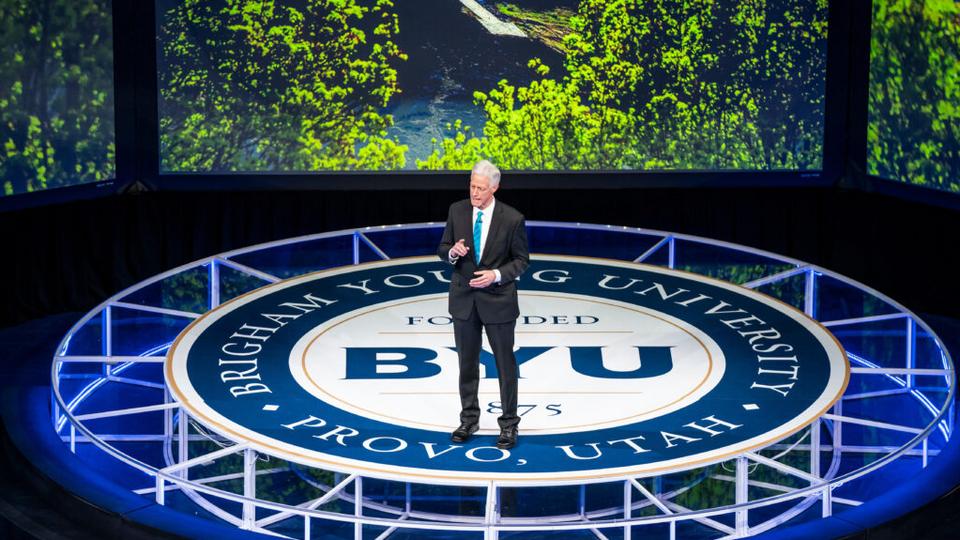
Worthen Fall 2020
BYU President Kevin Worthen speaks in the Marriott Center for the first devotional at the beginning of fall semester at BYU on September 8, 2020. Photo by Nate Edwards, courtesy of BYU Photo.2020 by Intellectual Reserve, Inc. All rights reserved.This story appears here courtesy of TheChurchNews.com. It is not for use by other media.
By Scott Taylor, Church News
BYU President Kevin J Worthen stood on a podium in the Marriott Center at Brigham Young University campus on the first Tuesday of the new fall semester to welcome students — just as he has done every semester for the past six years since being appointed the 13th president of the Church-owned university.
But this school year is “one unlike any other we have experienced,” President Worthen noted in his remarks on September 8. For one thing, instead of seeing thousands of BYU students’ faces, President Worthen and his wife, Sister Peggy Worthen, addressed empty seats.
With the beginning of classes on September 3, students once again began to gather on the Provo, Utah, campus for in-person classes, but Tuesday’s empty devotional venue served as another example of the wide range of adjustments being implemented because of the COVID-19 pandemic.
During a time and circumstance in which some might struggle to understand hope or how to draw upon its power in everyday ways, President Worthen shared not only his insights into “this key gospel concept,” but also four of his great hopes for students at BYU.
Four Hopes for Students
1. President Worthen’s first hope for students, he said, is that each student remains healthy and safe. “We are in the midst of a pandemic, and that requires that we do some things differently. … If we are to continue on with any face-to-face instruction, every one of us will need to be more vigilant in washing our hands, wearing a mask, social distancing and avoiding gatherings where those things are not observed,” he said.

Worthen Fall 2020
BYU President Kevin Worthen speaks in the Marriott Center for the first devotional at the beginning of fall semester at BYU on September 8, 2020. Photo by Nate Edwards, courtesy of BYU Photo.2020 by Intellectual Reserve, Inc. All rights reserved.2. The university president’s second hope is that each student will discover — or rediscover — the joy of discovery. “As hard as it may be to believe at times, learning can be an exhilarating, edifying experience, even when — or maybe especially when — it is exhausting. It can be joyful, particularly when it is facilitated by the Holy Ghost.”
3. In relating his third hope — that each student would fully feel a part of the BYU community — President Worthen noted his remarks at the recent university conference with Elder Quentin L. Cook of the Quorum of the Twelve Apostles. “I hope that we can each develop a loving, genuine concern for the welfare of all of God’s children, regardless of their race, gender, sexual orientation or other distinguishing feature, each of which is secondary to our common identity as beloved spirit children of Heavenly Parents.”
Learning to have difficult conversations without being difficult, held in love, will be necessary “if we are to be a true Zion community,” he said.
4. His fourth and most important hope is that “each of you can feel in greater measure God’s love for you individually,” he said.
During times when individuals wonder if there is any reason to hope, or if anyone cares, President Worthen invited listeners to ask God what He thinks of them. “I know that can seem to be a frightening endeavor since you know that He knows better than anyone all your faults,” President Worthen said. “But if you are truly sincere, you will be pleasantly surprised — because He loves you much more than you can imagine.”
God’s love for His children is perfect. “Not because you are perfect, not because you got admitted to BYU, not because you aced a test, not because your parents are proud of you — but because you are you — and you are His. If you feel that love more fully, you will find more hope in every circumstance and in all you do,” President Worthen promised.
Importance of Hope
Both modern and ancient scripture and modern and ancient prophets reiterate the importance of hope in individuals’ lives. “Scripture identifies hope as one of the three essential celestializing characteristics, firmly centered between foundational faith and exalting charity,” he explained.
However, it often gets less attention. “At times, it seems that we view hope as more of a grammatical connector between the two better-known bookends than we do as an eternal empowering concept whose development is equally central to God’s plan for us,” he said.
The reason? “The word hope has so many meanings in so many different contexts that its central significance sometimes gets lost,” President Worthen said.
For example, in today’s society, hope can seem to be just a weak form of positive thinking. A student might hope for a 4.0 GPA or for someone to accept an invitation for a date. However, especially in a gospel context, hope has a much more affirmative and certain role.
While hope can be “an anchor to [our] souls,” it can also “make [us] sure and steadfast” (Ether 12:4), President Worthen noted. “The right kind of hope can purify us (1 John 3:2-3). Nephi informs us that ‘a perfect brightness of hope’ (2 Nephi 31:20) is an essential part of the process by which we achieve eternal life. Hope is so central to our eternal progress that according to Moroni, ‘man must hope, or he cannot receive an inheritance in the place which [Christ] hast prepared’” (Ether 12:32).
And yet, President Worthen said, some scriptures seem to indicate that individuals need to have hope before they can have faith, while other scriptures seem to indicate that individuals must have faith before they can have hope.
Does hope come before or after faith? Is hope a predecessor or product of faith? “Let me suggest that the answer to all these questions is yes,” he said. “Hope comes before — and after — faith. It is both a predecessor and a product of faith.”
Nascent vs. “More Excellent” Hope
The Guide to the Scriptures describes hope as both “the confident expectation of and longing for the promised blessings of righteousness.” President Worthen explained that “longing for” the promised blessings describes a pre-faith kind of hope, while “confident expectation” describes a post-faith kind of hope, “the hope that is created after faith comes into the equation.”
President Worthen called the pre-faith longing for blessings a nascent, or just beginning to grow, hope. “Nascent hope comes into being by our choice — by the exercise of our agency.” As individuals “desire to believe” (Alma 32:27), “God can then engender faith in us by giving us an assurance that what we hope for — or desire — is truly possible.”
Faith can then lead to a stronger kind of hope, a more mature hope — the “confident expectation” described in the Guide to the Scriptures and that Moroni called in Ether 12:32 “a more excellent hope.”
In other words, “we begin with nascent hope, which comes into being when we exercise our agency to desire — or long — to believe,” President Worthen explained. “Once nascent hope is formed, we can then receive the spiritual assurance or confirmation that what we desire is true, which is the essence of faith. That confirmation of faith in turn creates a stronger, ‘more excellent’ form of hope.”
Strengthening Hope
It is not faith in general, President Worthen continued, that turns less-developed nascent hope into the more mature, durable, “more excellent” hope. “It is faith in the Lord Jesus Christ. It is the constant exercise of faith in Christ that transforms what would otherwise be merely wishful thinking into the kind of hope that becomes an anchor to our soul. We have to plant our desires, our hope, in Him.”
Individuals who want to strengthen their hope should focus more on the Savior, especially when they feel hopeless. “One of the simplest, but most powerful, ways we can do that is to follow His example by serving others,” President Worthen said. “When we find ourselves struggling to find hope, we should reach out to someone in need, as the Savior constantly did.”
Doing so will shift the focus to others and desires for their well-being. The addition of faith to righteous desires can transform small, nascent hope into an enduring, powerful, more excellent form of hope. “Christ-like service is often the seedbed of hope — on both sides of faith. Thus, just as Christ is the ‘author and finisher of our faith’ (Hebrews 12:2), He is also the author and finisher of our hope.”
There might be times where a nascent hope “is all we can muster.” However, in moments where it feels like an individual is holding on to their last shred of hope, “please be assured that it will be enough,” President Worthen said.
“While it may not seem like much, the smallest form of hope — the smallest desire to believe — can be the first step in a miraculous process through which God can exalt us.”
Copyright 2020 Deseret News Publishing Company